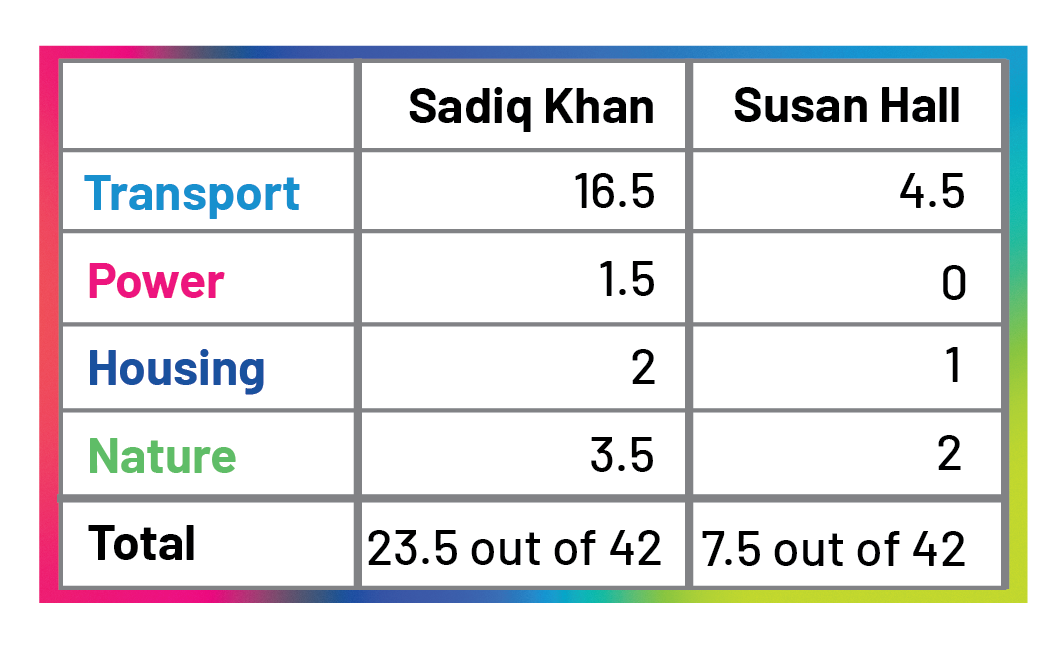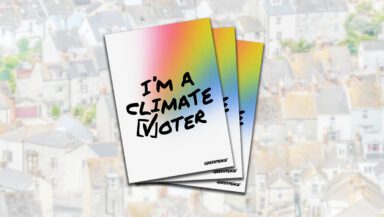On Thursday 2 May, Londoners will go to the polls to elect the Mayor of London for the next five years.
Whether you take the bus or tube to work, or cycle along busy city streets; whether you live in Zone 1 or Zone 6, in a block of flats or a boat on the Thames – a cleaner, greener London is important to all Londoners.
The Mayor of London is not just a figurehead – the office has real power to make big decisions that will affect the lives of millions of people.
Greenpeace has scored several London Mayoral Election candidates’ manifestos to find out how they stand on green issues that matter to Londoners: climate; nature; wildlife; healthy air; transport; warm homes; clean energy.
So, do Londoners have a climate champion in the next Mayor of London?
First, a bit of detail about the Mayoral election on 2 May. It will run on a First-Past-The-Post system for the first time. This means voters in London only have one vote for who they want to be mayor. So Londoners will have to make it count.
According to polling, only the two current frontrunners from the biggest parties – Sadiq Khan for Labour and Susan Hall for the Conservatives – are likely to win.
The scoring: who measures up on green issues for London?
Greenpeace has scored their manifestos out of a total of 42 points across key issues relating to climate and nature. The more power the mayor has on a particular issue, the higher the maximum possible score.
Here’s how they measure up, with their main promises summarised:
Sadiq Khan, Labour: 23.5 out of 42
On transport, Sadiq Khan’s manifesto commits to more and cleaner trains and buses, more EV charge points and more bike parking. It also promises safer air across the city and especially around schools
On energy, Khan’s manifesto commits to warmer homes for Londoners, with lower bills and solar-powered, energy efficient schools which can invest more in young people instead of energy company profits.
And also makes a commitment to healthy rivers in London.
Susan Hall, Conservatives: 7.5 out of 42
On transport, Susan Hall’s manifesto also includes plans for EV charging, but that’s about it. In fact, Hall wants to undo existing work to clean up London’s toxic air and make cycling safer.
She also plans to increase car use – even though London is already one of the most car-choked cities in the world.
How do the frontrunners compare?
Out of them, there is clearly a better candidate for Londoners to elect when it comes to climate and the environment – and that’s Sadiq Khan.
Here are the breakdown of the scores:

There’s a huge gulf of 16 points between the two frontrunners’ policies on climate, nature and healthy air.
Sadiq Khan’s environmental and climate policies rank more than three times higher than Susan Hall’s.
What about the other candidates, like the Green Party?
There are more than two candidates standing to be mayor – in total, there are 13 candidates. We checked the other manifestos and in particular looked at the Green party manifesto.
As a point of comparison, Green candidate Zoë Garbett’s manifesto scored very highly (34 out of 42). This helps show some important areas for improvement in Sadiq Khan’s plan. For example, the Greens have a more ambitious plan for greener transport; and to improve energy efficiency and roll out renewables.
However because this mayoral election will run on a First-Past-The-Post system for the first time, only the two front-running candidates are likely to win.
Whatever the voting system, elections are a crucial moment for communities and the climate – and not just in London.
This year, a general election is coming up. People all over the country are committing to vote for candidates willing to show strong leadership on climate and nature.



